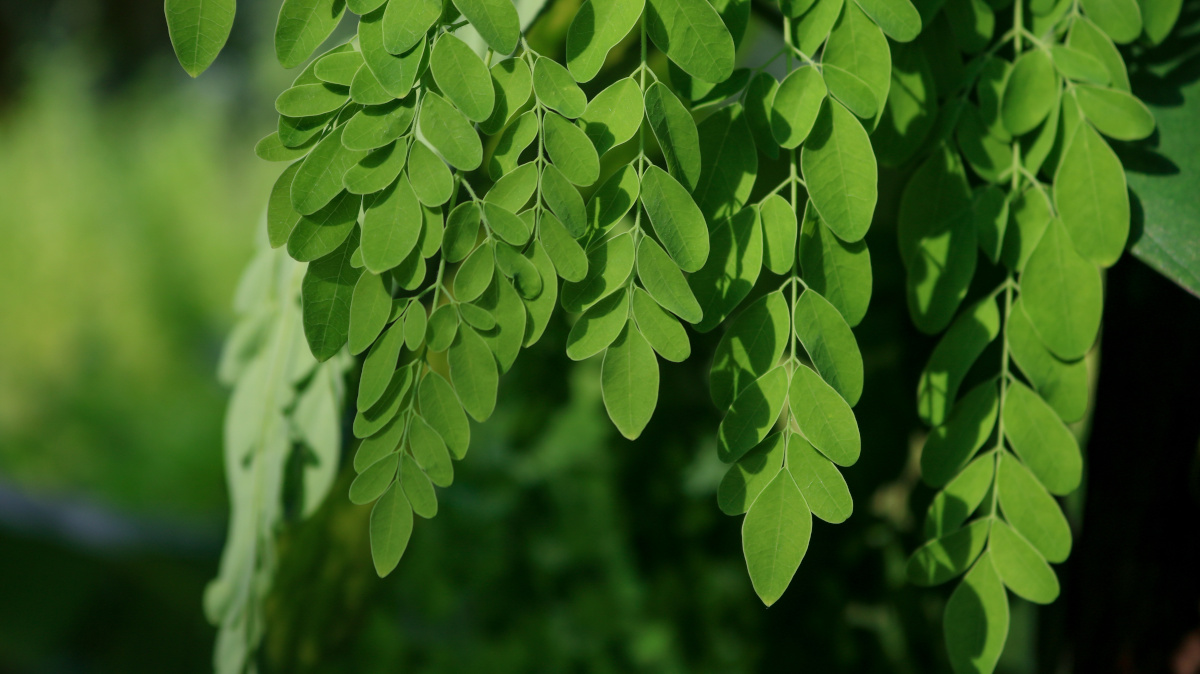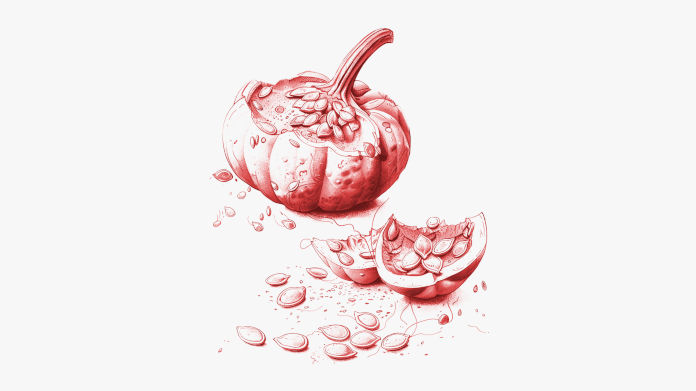Moringa: the 4 virtues of the Tree of Life
Moringa oleifera, or ‘Tree of Life’, is a key plant in the diet and traditional pharmacopeia of many tropical countries, reputed to be able to treat 300 diseases. Here we focus on 4 of its key benefits.

Moringa oleifera: the multi-beneficial Tree of Life
A fast-growing tropical tree native to Asia, and India in particular, moringa, or Moringa oleifera to give its botanical name, is a plant with multiple benefits for health.
Its fruit, roots, bark, seeds, and leaves are all used in the countries in which it grows naturally: Southeast Asia, Indonesia, India, Ethiopia, Chad, etc. In English-speaking countries, it’s known as the horseradish tree (because its root tastes similar to horseradish), as brede mouroum in Réunion, etc.
Moringa is widely used as a cooking ingredient in many countries because of its high nutrient content, its ability to withstand drought, and because it produces young shoots and leaves in the dry season when food becomes scarcer.
It’s for this reason, and because it’s the basis of the vegetarian diet in India, that it is known as the Tree of Life.
But moringa has also been used for thousands of years in Ayurvedic medicine. In addition to having a high nutrient content, it’s a medicinal plant with numerous benefits for health (1).
Moringa can treat 300 diseases? Really?
Ayurvedic medicine credits moringa with the ability to treat more than 300 health problems, including colds, diabetes and high blood pressure. According to this age-old Indian system of medicine, moringa is also good for the kidneys, hair, and sleep. But as we’ll see, recent scientific research has concentrated primarily on its benefits for blood sugar levels (2).
The 4 key benefits of moringa
While every part of the plant is used in cooking in the various regions of the world in which this tropical tree grows, it’s the leaves in particular, that are currently the subject of scientific study. They contain numerouspolyphenols, alkaloids, such as glucosinolates and isothiocyanates, as well as saponins. They are also easily dried and made into powder to produce moringa capsules (3).
Moringa and glycemia: a tool for fighting diabetes?
While research is ongoing to establish the precise mechanisms behind moringa’s effects, several studies have shown that supplementing with moringa for several weeks can reduce blood sugar levels by up to 30% in diabetic individuals. Moringa consumption also appears to increase insulin sensitivity.
Even more interestingly, other studies have demonstrated similar glycemia-lowering effects in ‘healthy’ individuals.
That’s why extract of moringa leaf is now considered to be a potential natural remedy for diabetes and is recognized by the EFSA for supporting glucose metabolism (4-5).
Moringa: a nutritional powerhouse
Moringa is not only a staple food in certain regions of India, but this Tree of Life has also attracted the attention of numerous NGOs such as Action Against Hunger, the Red Cross, and UNICEF. The reason for this is its remarkable nutritional value.
Moringa is rich in (6) :
- minerals (it contains 3 times as much potassium as bananas, 4 times as much calcium as milk, and as much magnesium as dark chocolate);
- vitamins A, C and E (it contains 4 times as much vitamin A as carrots and 7 times as much vitamin C as oranges);
- high-quality protein, containing all 9 essential amino acids (and twice as much protein as yogurt).
A potential anti-inflammatory and antioxidant?
Moringa’s high content of polyphenols, saponins, glucosinolates, and isothiocyanates has also prompted researchers to investigate this medicinal plant’s potential as an anti-inflammatory and antioxidant (7).
Some studies suggest that moringa leaf extract inhibits production of pro-inflammatory cytokines by macrophages and reduces the activity of genes involved in inflammation (8).
And a number of other studies are evaluatingmoringa’s antioxidant potential, because of its high content of tocopherols and beta-carotene, amongst others.
According to an article on the plant produced by the FAO (Food and Agriculture Organization of the United Nations), moringa products have antibiotic, hypotensive, antispasmodic, antiulcer, anti-inflammatory, cholesterol-lowering, and hypoglycemic properties (9).
Moringa and the kidneys, sleep, and hair
Moringa seeds are also rich in fatty acids such as behenic acid, oleic acid, and palmitoleic acid, as well as in antioxidants. For this reason, oil extracted from its seeds is widely used in hair and skincare products (10).
In addition, studies indicate that its antioxidant and anti-inflammatory potential could benefit the kidneys, which moringa may protect from disease (11).
And finally, while some studies suggest that moringa may improve sleep quality, the only real effect shown is that moringa boosts the sedative action of pentobarbital, a barbiturate used as a sleeping pill and anesthetic in surgery. Moringa’s effects on sleep are thus being evaluated for pharmaceutical applications (12).
Potential risks of moringa
The only contraindication associated with moringa relates to women who are pregnant or breastfeeding, due to a lack of data on the plant’s effects on the fetus or infant.
You can obtain moringa’s benefits by taking a course of moringa leaf extract supplements in capsule form, (such as the product Organic Moringa Leaf Extract).
SuperSmart ADVICE
References
- ANWAR, Farooq, LATIF, Sajid, ASHRAF, Muhammad, et al.Moringa oleifera: a food plant with multiple medicinal uses. Phytotherapy Research: An International Journal Devoted to Pharmacological and Toxicological Evaluation of Natural Product Derivatives, 2007, vol. 21, no 1, p. 17-25.
- SOUMYA, M. C., SINIMOL, T. P., et SUMEDHAN, Varsha. Pharmacological aspects of Sigru (Moringa oleifera Lam.) in view of Ayurveda. Journal of Ayurveda and Integrated Medical Sciences, 2019, vol. 4, no 01, p. 39-42.
- MARRUFO, Tatiana, NAZZARO, Filomena, MANCINI, Emilia, et al.Chemical composition and biological activity of the essential oil from leaves of Moringa oleifera Lam. cultivated in Mozambique. Molecules, 2013, vol. 18, no 9, p. 10989-11000.
- EDOGA, C. O., NJOKU, O. O., AMADI, E. N., et al.Blood sugar lowering effect of Moringa oleifera Lam in albino rats. Int J Sci Technol, 2013, vol. 3, no 1, p. 88-90.
- OWENS III, Frederick S., DADA, Oluwabunmi, CYRUS, John W., et al.The effects of Moringa oleifera on blood glucose levels: a scoping review of the literature. Complementary Therapies in Medicine, 2020, vol. 50, p. 102362.
- ANWAR, Farooq, LATIF, Sajid, ASHRAF, Muhammad, et al.Moringa oleifera: a food plant with multiple medicinal uses. Phytotherapy Research: An International Journal Devoted to Pharmacological and Toxicological Evaluation of Natural Product Derivatives, 2007, vol. 21, no 1, p. 17-25.
- NDIAYE, M., DIEYE, A. M., MARIKO, F., et al.Contribution to the study of the anti-inflammatory activity of Moringa oleifera (Moringaceae). Dakar medical, 2002, vol. 47, no 2, p. 210-212.
- VASANTH, K., MINAKSHI, G. C., ILANGO, K., et al.Moringa oleifera attenuates the release of pro-inflammatory cytokines in lipopolysaccharide stimulated human monocytic cell line. Industrial Crops and Products, 2015, vol. 77, p. 44-50.
- https://www.fao.org/traditional-crops/moringa/fr/
- KLEIMAN, Robert, ASHLEY, David A., et BROWN, James H. Comparison of two seed oils used in cosmetics, moringa and marula. Industrial Crops and Products, 2008, vol. 28, no 3, p. 361-364.
- AKTER, Tanzina, RAHMAN, Md Atikur, MONI, Akhi, et al.Prospects for protective potential of Moringa oleifera against kidney diseases. Plants, 2021, vol. 10, no 12, p. 2818.
- LIU, Wei-Liang, WU, Bai-Fen, SHANG, Jian-Hua, et al.Moringa oleifera Lam seed oil augments pentobarbital-induced sleeping behaviors in mice via GABAergic systems. Journal of agricultural and food chemistry, 2020, vol. 68, no 10, p. 3149-3162.
Keywords
1 Days
great products and prices
great products and prices
Marie
7 Days
Easy to navigate site
Easy to navigate site, had what I was searching for, good price. easy order-check out
James Tucker
13 Days
My skin is clearing up nicely!
Pretty good for my skin so far.
Christian
15 Days
The new packaging is excellent
The new packaging is excellent - finally! No more squashed boxes and torn envelopes.
GORAN
16 Days
Great Product
Great Product
Larry Garrett
21 Days
Quick shipping
Quick shipping; good price. No issues!
Mary McCarty
22 Days
Thr product is very good and is helping…
Thr product is very good and is helping me on my health. Then is always on time
LUGO Luz
25 Days
Buying was fine
Buying was fine. I had problems with the website not recognizing my login info, and had to call to get it fixed. Other than that, everything was good.
David S. Clark
25 Days
Your super maca and super ginseng are…phenomenal
Your super maca and super ginseng are phenomenal supplements that compliment each other when taking them together. Fantastic feeling of well-being and lots of mid day energy without the crash.
Keith Mason
28 Days
I have had amazing results with every…
I have had amazing results with every supplement I've purchased. I am extremely satisfied with this company
kirstin Torres
28 Days
Fine products
Fine products . They are on the leading edge of online supplements. The only issue -so far-is they sometime run out of subscription items.
Jason Argos
30 Days
The ordering process is very user…
The ordering process is very user friendly and the products always come in a timely manner.
CARTER Rhonda
31 Days
The price for Dr
The price for Dr. Pero's AC-11 is reasonable and in line with his views. (my former colleague). Keep it pure.
CAMPBELL Clayton
34 Days
Right on every time.
Right on every time.
Arthur Nicholas
37 Days
They are cheaper than everyone else and…
They are cheaper than everyone else and the shipping was fast. Great company.
Patricia Adams





